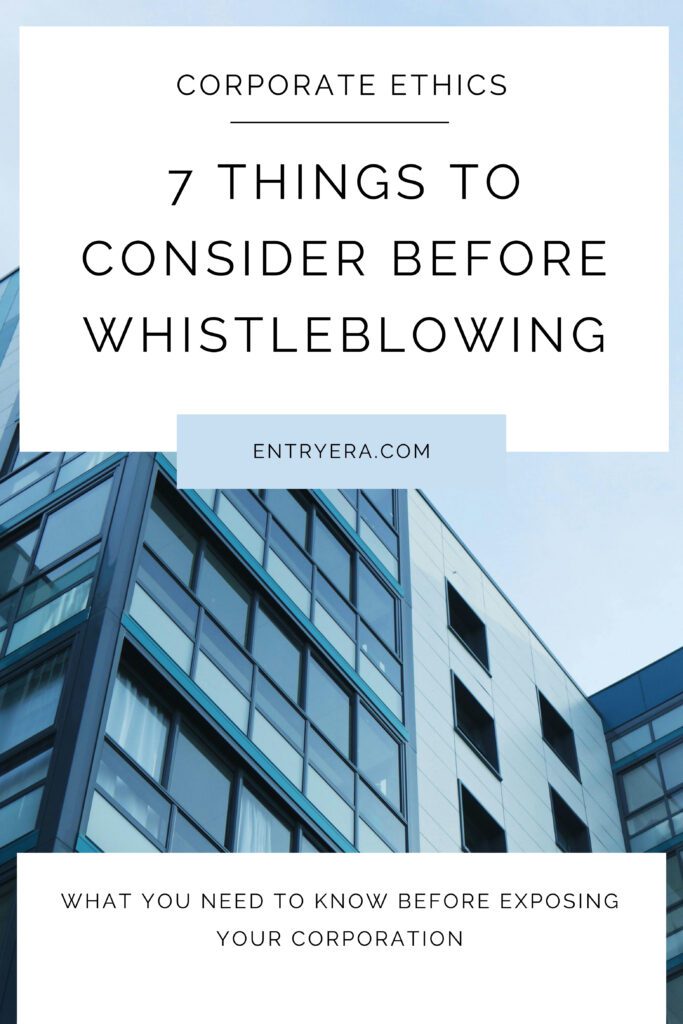Whistleblowers, often unrecognized and sometimes vilified, serve as the vigilant custodians of truth in our society. They defy convention and risk their livelihoods to expose wrongdoing, whether it be corporate malfeasance or government corruption.
In this blog, we embark on an exploration of whistleblowing, seeking to understand its essence and the profound impact it holds. From the halls of power to the inner workings of corporations, whistleblowers stand as beacons of integrity, challenging injustice and demanding accountability.
Through their courageous actions, they shed light on dark corners, illuminating the path towards transparency and justice for all. Join us as we delve into the world of whistleblowing, honoring those who dare to speak out and championing their vital role in preserving the fabric of our society.

Jump to:
- Whistleblower definition
- Why do whistleblowers matter?
- Examples of whistleblowers
- How to whistleblow
- Whistleblower protections
- 7 things to consider before whistleblowing
- Whistleblowing consequences
What is a whistleblower?
A whistleblower is someone who brings to light instances of wrongdoing or misconduct within an organization, often at great personal risk.
This individual typically possesses insider knowledge of the unethical or illegal activities they expose and chooses to disclose this information in order to uphold principles of transparency, accountability, and justice.
Whistleblowers serve as vital guardians of integrity in both public and private sectors, shining a light on corruption, fraud, or other forms of malpractice. They often face significant personal and professional challenges, including retaliation, legal battles, and social ostracism.
Despite these risks, whistleblowers play a crucial role in maintaining ethical standards and promoting reforms within organizations.
Their courageous actions can lead to significant positive changes, such as policy reforms, legal actions against wrongdoers, and increased public awareness about critical issues.
Defining whistleblowers: who are they?
Whistleblowers are often employees, contractors, or former employees who possess insider knowledge of unethical or illegal activities. These individuals typically have a strong sense of integrity and a commitment to principles of transparency, accountability, and justice.
Whistleblowers can come from any level within an organization, from entry-level staff to senior executives. They might be accountants who uncover financial fraud, safety inspectors who notice violations, or IT professionals who discover data breaches.
Related article: Shattering the Glass Ceiling: Strategies for Women in Leadership
Regardless of their role, whistleblowers share a common willingness to speak out against wrongdoing, even at the risk of personal and professional consequences.
Their disclosures can involve a wide range of issues, such as fraud, corruption, safety violations, or environmental hazards.

Why are whistleblowers important?
Whistleblowers are important because they serve as vital guardians of integrity in both public and private sectors. By exposing wrongdoing, they help to uncover and address corruption, fraud, and other forms of malpractice that might otherwise remain hidden.
Whistleblowers contribute to the enforcement of laws and regulations, the improvement of organizational practices, and the protection of public interest.
Their actions can lead to significant positive changes, including policy reforms, legal actions against wrongdoers, and increased public awareness of critical issues.
Without whistleblowers, many serious issues would go unchecked, resulting in continued harm and injustice.
The moral and ethical dilemmas faced by whistleblowers
Whistleblowers often face significant moral and ethical dilemmas. On one hand, they must grapple with the decision to disclose information that could harm their colleagues, jeopardize their careers, and disrupt their lives.
On the other hand, they feel a moral obligation to expose wrongdoing and protect the greater good.
This internal conflict can be intense, as whistleblowers weigh their loyalty to their organization and peers against their duty to uphold ethical standards and the law.
Additionally, the potential for retaliation, such as job loss, legal battles, and social ostracism, adds to the complexity of their decision. Despite these challenges, many whistleblowers choose to act based on their commitment to integrity and justice, often at great personal cost.
Whistleblower examples
Now that we’ve defined what a whistleblower is and their moral obligation, let’s take a look at some of the more famous examples of a whistleblowing case.
1. Edward Pierson: The Boeing whistleblower
Edward Pierson, a former senior manager at Boeing, raised serious concerns about production issues at the Boeing 737 Max plant. He warned of production pressures and safety issues, believing these factors contributed to the crashes of Lion Air Flight 610 and Ethiopian Airlines Flight 302.
Pierson’s testimony before Congress and his detailed reports highlighted critical safety lapses, contributing to increased scrutiny of Boeing’s practices and regulatory oversight, eventually leading to the grounding of the 737 Max and significant changes in Boeing’s production processes and corporate governance.
Read more about the Boeing whistleblower here.

2. Sherron Watkins: The Enron whistleblower
Sherron Watkins, a former vice president at Enron, is known for exposing the massive accounting fraud that led to Enron’s collapse. In 2001, she sent an anonymous memo to Enron’s CEO, Kenneth Lay, warning of accounting irregularities and the potential for the company to “implode in a wave of accounting scandals.”
Her disclosures played a key role in the subsequent investigations that revealed extensive fraud and corruption.
The Enron scandal led to the bankruptcy of the company, criminal convictions for several executives, and the establishment of new regulations to improve corporate accountability, such as the Sarbanes-Oxley Act.
3. Frances Haugen: The Facebook whistleblower
Frances Haugen, a former product manager at Facebook, disclosed thousands of internal documents in 2021, revealing how the company was aware of the negative impact of its platforms on society, including issues related to mental health, misinformation, and political polarization.
She testified before the U.S. Congress, emphasizing that Facebook prioritized profit over safety.
Haugen’s revelations led to widespread public and governmental scrutiny, sparking debates over social media regulation, and prompting calls for more robust oversight and reforms in how tech companies operate and manage user data.
Related article: How to Develop an Ethical Marketing Strategy That Works (3 Brilliant Examples)
How to be a whistleblower
To be a whistleblower, start by gathering all relevant evidence and documentation of the wrongdoing or misconduct you intend to expose. Ensure that this information is accurate, thorough, and well-organized.
Next, familiarize yourself with your organization’s whistleblowing policies and any relevant laws or regulations that may protect you. It’s important to understand your rights and the proper channels for reporting.
Consider seeking legal advice to better navigate the process and protect yourself. When ready, report the issue through the appropriate internal or external channels, such as a compliance officer, an ombudsman, or a regulatory agency.
Throughout this process, maintain confidentiality as much as possible to protect yourself from potential retaliation. Lastly, be prepared for potential challenges and remain steadfast in your commitment to transparency and accountability.
What happens if you are a whistleblower?
If you are a whistleblower, you may face a range of outcomes, both positive and negative. On the positive side, your actions can lead to significant changes, such as the rectification of wrongdoing, improved policies, and enhanced organizational accountability.
Your courage may be recognized and appreciated by the public and regulatory bodies. However, there can also be negative consequences, including retaliation from your employer or colleagues, such as job loss, demotion, harassment, or social ostracism. Legal battles and emotional stress are also common.
Many countries have laws and regulations in place to protect whistleblowers, but the level of protection and support can vary. It’s crucial to be aware of these potential outcomes and seek support from legal professionals, advocacy groups, and trusted individuals throughout the process.

Protections for whistleblowers
Protections for whistleblowers vary depending on the country and the specific laws in place. Generally, these protections aim to shield whistleblowers from retaliation such as job loss, demotion, harassment, or other adverse actions.
Many countries have enacted laws that provide legal recourse for whistleblowers who face retaliation, offer confidentiality provisions to protect their identity, and sometimes include financial incentives for reporting certain types of wrongdoing.
In addition to legal protections, some organizations have internal policies and procedures designed to support and protect whistleblowers. It’s crucial for potential whistleblowers to familiarize themselves with the specific protections available in their jurisdiction and to seek legal advice if necessary.
Is it safe to be a whistleblower?
Being a whistleblower carries inherent risks, and safety can vary widely depending on the circumstances and protections in place. While many countries have laws designed to protect whistleblowers from retaliation, these safeguards are not always effective or comprehensive.
Whistleblowers can face significant challenges, including professional, legal, and personal repercussions.
However, taking steps such as gathering solid evidence, understanding your rights, using anonymous reporting channels, and seeking legal advice can help mitigate these risks.
Despite potential dangers, many whistleblowers successfully expose wrongdoing and contribute to positive changes, highlighting the importance of their role in promoting transparency and accountability.
Whistleblower protection act
The Whistleblower Protection Act (WPA) is a U.S. federal law designed to protect federal employees who disclose information about wrongdoing within government agencies.
Enacted in 1989 and amended by the Whistleblower Protection Enhancement Act of 2012, the WPA aims to shield whistleblowers from retaliation, such as termination, demotion, or harassment.
It provides mechanisms for whistleblowers to report misconduct and seek remedies if they experience retaliation. The WPA also includes provisions to ensure confidentiality and promote the accountability of federal agencies.
By offering these protections, the act encourages individuals to come forward with information about corruption, fraud, and other forms of misconduct, thereby enhancing transparency and integrity in the federal government.

How do you effectively whistleblow?
To effectively whistleblow, start by gathering comprehensive and detailed evidence of the wrongdoing or misconduct. Ensure your information is accurate and well-documented. Familiarize yourself with your organization’s whistleblowing policies and any relevant laws that provide protection.
Consider seeking legal advice to understand your rights and the potential risks involved. Choose the appropriate channel for reporting the issue, whether it’s an internal compliance officer, an ombudsman, or an external regulatory agency.
Maintain confidentiality as much as possible to protect yourself from retaliation.
Lastly, be prepared for potential challenges and remain committed to upholding transparency and accountability.
7 things to consider before whistleblowing
- Evidence collection: Ensure you have detailed and credible evidence to support your claims. This includes documents, emails, recordings, or any other relevant information that can substantiate the misconduct.
- Understanding protections: Familiarize yourself with legal protections available for whistleblowers in your jurisdiction. Know your rights and the laws designed to protect you from retaliation.
- Potential risks: Be aware of the possible personal and professional risks, such as job loss, demotion, legal action, or social ostracism. Consider how these risks might impact you and your family.
- Internal policies: Review your organization’s internal whistleblowing policies and procedures. Understanding these can help you navigate the process more effectively and determine the best way to report the wrongdoing.
- Legal advice: Seek legal counsel to guide you through the process. A lawyer can provide valuable advice on how to protect yourself and ensure your actions are legally sound.
- Confidentiality: the importance of maintaining confidentiality to protect your identity and minimize the risk of retaliation. Use anonymous reporting channels if available.
- Support systems: Identify and rely on support systems, such as trusted colleagues, friends, family, or whistleblower advocacy groups. Emotional and moral support can be crucial as you navigate the challenges of whistleblowing.
Related article: Should You Be Attending Networking Events? The Importance of Connections

What are the main consequences of whistleblowing?
The main consequences of whistleblowing can be both positive and negative, impacting the whistleblower on personal, professional, and legal levels.
On the positive side, whistleblowing can lead to significant organizational changes, such as the rectification of wrongdoing, implementation of improved policies, and enhanced transparency and accountability.
Whistleblowers may be lauded for their courage and contribution to the public good, potentially receiving legal protection and financial rewards. However, the negative consequences can be severe.
Whistleblowers often face retaliation from their employers or colleagues, including job loss, demotion, harassment, and social ostracism. They may also endure prolonged legal battles and significant emotional and psychological stress.
Despite legal protections in place, these measures are not always sufficient to fully shield whistleblowers from adverse effects. Therefore, while whistleblowing is a powerful tool for promoting integrity and justice, it often comes with substantial personal and professional risks.
So, should you whistleblow?
Deciding to whistleblow is a deeply personal and complex decision, fraught with both potential rewards and significant risks.
While whistleblowers play a crucial role in uncovering wrongdoing and promoting accountability, they often face substantial personal and professional challenges.
It is essential to carefully weigh the evidence you have, understand the protections available to you, and consider the potential consequences before taking action. Seeking legal advice and support from trusted individuals can help navigate this difficult path.
Ultimately, whistleblowing can lead to positive change and justice, but it requires a steadfast commitment to integrity and a readiness to face possible adversity.








